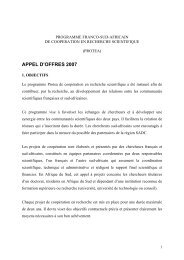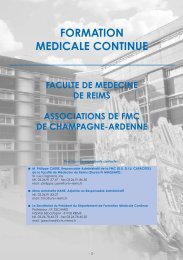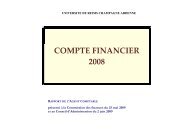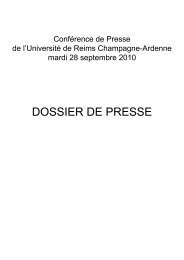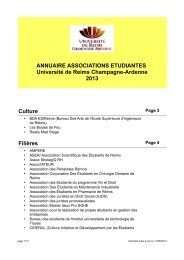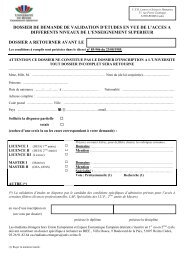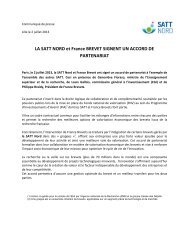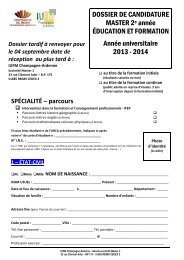reCeption serviCes for internAtionAl stUdents - Université de Reims ...
reCeption serviCes for internAtionAl stUdents - Université de Reims ...
reCeption serviCes for internAtionAl stUdents - Université de Reims ...
You also want an ePaper? Increase the reach of your titles
YUMPU automatically turns print PDFs into web optimized ePapers that Google loves.
ACCOMMODATION<br />
Essential steps<br />
ACCOMMODATION<br />
INSURANCE (or “renter‘s<br />
insurance”)<br />
As soon as you have found an accommodation,<br />
you must obtain accommodation<br />
insurance (combining personal and property<br />
insurance). It covers you against theft, fire,<br />
leaking damages, etc., as well as personal<br />
liabilities. At the CROUS you will receive the<br />
keys to your room only after you have<br />
obtained accommodation insurance.<br />
>> See Chapter 5, The housing and civil<br />
responsibility insurance<br />
GUARANTOR (“Garant”)<br />
It can be helpful to have a guarantor<br />
in case you have a problem settling your<br />
rent in time. The guarantor must be a<br />
resi<strong>de</strong>nt of the European Union and should<br />
be able to give proof of a monthly<br />
income that is at least equal to three<br />
times the monthly rent.<br />
Stu<strong>de</strong>nts from outsi<strong>de</strong> the European Union<br />
who are accommodated by the CROUS must<br />
pay three months rent in advance (in the<br />
absence of a guarantor).<br />
This is the major barrier <strong>for</strong> the<br />
non - European Community stu<strong>de</strong>nts looking<br />
<strong>for</strong> accommodations, because some owners<br />
request the guarantor to be French in<br />
or<strong>de</strong>r to facilitate the various administrative<br />
procedures. Some landlords ask <strong>for</strong> the<br />
rent several months in advance in the<br />
absence of a guarantor. Shared flats<br />
(“co - location”) can help solve the problem.<br />
INVENTORY<br />
An inventory (or “un état <strong>de</strong>s lieux”) is a<br />
document signed by the owner and by the<br />
lodger, which <strong>de</strong>scribes the condition of<br />
each room of the apartment at the time the<br />
resi<strong>de</strong>nt moves in.<br />
It is very important to note everything precisely<br />
(the state of the floor, of the ceiling,<br />
the humidity, the post-box, the heaters,<br />
the taps, all of the equipment, etc.) If you<br />
notice any damage after you have completed<br />
the inventory, announce it to the owner<br />
by sending a letter with recor<strong>de</strong>d <strong>de</strong>livery<br />
within a period of 21 days after having<br />
moved into the apartment.<br />
Be<strong>for</strong>e leaving your apartment you will need<br />
to do a second inventory (or exit log) to<br />
verify the existence or the absence of any<br />
damage in the apartment. Again, this must<br />
be done in the presence of the owner and<br />
the resi<strong>de</strong>nt. If there is any damage the<br />
owner will cover the repair costs from the<br />
<strong>de</strong>posit; if there is no damage the <strong>de</strong>posit<br />
will be returned to the lodger.<br />
RESIDENCE TAX<br />
For private apartments. As a resi<strong>de</strong>nt of<br />
France, you must pay a resi<strong>de</strong>nce tax. This<br />
tax is to be settled in the year following the<br />
year you rented the apartment that you<br />
occupied on January, 1st.<br />
After you leave France you will receive<br />
a notice asking you to pay this tax. The<br />
amount of the tax usually corresponds to<br />
about one month‘s rent.<br />
>> See Chapter 8, Miscellaneous, Glossary<br />
36 \ 5. Practical In<strong>for</strong>mation



